#walter allen: you were saying?
Text
Got this one up too! Bit of a merger idea between the Vigilante AU from @kkolg and the Sea of Blue Ink AU @blottart414 . Some tweaks have been made to Lolligo's backstory to make it work, but mostly just letting the kids play and see what happens.
#bendy and the ink machine#batim vigilante au#batim sea of blue ink au#bendy#lolligo#caged kraken au#au merger#nemo's writing#batim#lolligo is probably going to adopt bendy#lolligo: [about bendy] this is mine now#AND NO ONE CAN STOP ME#walter allen: you were saying?#demon deals and criminal underworld stuff#fun times
12 notes
·
View notes
Text
So, there's this famous quote (and source of many memes) from Northanger Abbey, where Henry Tilney says:
“and this is a very nice day, and we are taking a very nice walk, and you are two very nice young ladies. Oh! It is a very nice word indeed! It does for everything. Originally perhaps it was applied only to express neatness, propriety, delicacy, or refinement—people were nice in their dress, in their sentiments, or their choice. But now every commendation on every subject is comprised in that one word.” (chapter 14)
Indeed, Jane doesn't seem to like the word that much, at least in this novel: of the 14 times it is used, 3 happen before this exchange, 10 during it, and then one last time in chapter 29.
It appears
7 times in Pride and Prejudice (used mainly by Lydia, but also by Mrs Bennet, Mrs Gardiner and Lady Catherine);
12 in Sense and Sensibility (by sir John, Marianne, Edward, Mrs Palmer, and Mrs Jennings most of all);
17 in Emma (by Harriet, Mr Woodhouse, Emma, Miss Bates, Mrs Elton, and Mr Weston);
15 in Mansfield Park (by Mrs Grant, Mrs Norris, Mary, Tom, Mr Crawford, Maria, and Edmund);
12 in Persuasion (by Elizabeth, Wentworth, Admiral Croft, Mr Elliot, Mary
But of those, none are used by the narrator in NA; 2 in P&P; 3 in S&S; 5 in Emma; 4 in MP; and 6 in Persuasion (and I'm including all indirect speech). Very nice.
But you know what generic, vague descriptor our beloved Jane loved? fine.
NA: 33 times (18 from dialogue: used my Mrs Thorpe, Mr Allen, Mrs Allen, John Thorpe, Catherine, a miss Thorpe, Isabella, Tilney, and Mrs Morland.)
P&P: 40 times (21 in dialogue: used by Mrs Bennet, Charlotte, Lizzy, Darcy, Caroline, Mrs Gardiner, Mrs Reynolds, and Mr Bennet)
S&S: 29 times (17 in dialogue: used by Willoughby, Marianne, Edward most of all, Mrs Palmer, Anne Steele, and Mrs Jennings)
Emma: 48 times (33 in dialogue: used by Harriet, Mr Woodhouse, Mr Knightley, Emma, Miss Bates, Jane Fairfax, Mr Weston, Frank, Mrs Cole, Mrs Elton)
MP: 67 times (38 in dialogue: used by Mr Rushworth, Lady Bertram, Edmund, Mrs Norris, Fanny, Mrs Grant, Dr Grant, Mr Crawford, William, Mrs Price, Mr Price, and Mary)
Persuasion: 35 times (17 in dialogue: by Mrs Musgrove, Mrs Croft, Charles Musgrove, Sir Walter, Admiral Croft, Captain Wentworth, lady Dalrymple, Harriet Smith).
Not only is fine used much, much more than nice, but nice is most often used by silly or unrefined characters, whereas fine sees more representation of all sorts of characters, and it is used by the narrator specifically, much, much more, not only to describe weather, but to describe people, places, clothes, and so on and so forth.
So, dear Jane, I think we need to talk...
95 notes
·
View notes
Note
specialist literature such as? let's say we've exhausted Heilbroner and other intro stuff, what else is worth digging into from your perspective
sorta depends on what specifically you're looking for but in general i tend to like a lot of what you might call the "revisionist" historians. people like keith tribe, terence hutchison, donald winch etc are great at a more general level (although each has their focuses, for sure). tribe is still churning stuff out but the other two are dead, so although they have real strengths some of the literature has moved on without them.
otherwise ive been going through ryan walter's before methods and models which has been super eye opening for me while also basically affirming my prior belief that what we usually call "political economy" in its heyday was just a form of parliamentary debate with explicit concerns surrounding whatever the bank of england was doing. terry peach's interpreting ricardo seems to be a good corrective that i can work with, but i'm also about to revisit ricardo's principles with a group (after we finish smith) so it'll be interesting to see how a lot of my more recent readings map onto the primary sources. i'll likely be posting through it regardless.
in a big way, i'm trying to just chart a course through the history of econ which doesn't have to repeat the mistakes of the 20th century debates, especially re: ricardo. i disagree with sraffa, mirowski, and the marshall/hollander readings which tend to dominate so much of the literature and color our understanding of "classical economics", all of which have consequences for how we would necessarily have to read marx.
speaking of marx, i of course think heinrich's science of value and the biography will be crucial for how we ought to think about the CoPE, but allen oakley's work is probably the only available work in english of its kind which attempts to grapple with his sources in a meaningful way which gets at his successes in thinking through political economy as a discipline (although the works show their age, all being written in the 80s). a step removed from all of this (although closely related to tribe) is the anglo maoish post-althusserian reception of marx's CoPE from people like hindess & hirst, who spent a lot of time seriously thinking about marx and the limits of his analysis. i don't think they got everything right by any means, but they were able to deliver some serious blows to plenty of the marxists on the ground at the time and in some ways i think that they initiated the kind of crank project i see myself as contributing to.
14 notes
·
View notes
Note
Hello again, not quite sure how to formulate this question, but on the topic of EM Forster, I read most of his novels many years ago, and then recently re-read The Longest Journey. I really enjoyed it and I like the themes, but I found the style quite strange and a bit hard to follow at times. I've read that the book was meant to be 'symbolic' and not particularly realistic. But anyway, I wondered what you made of the style of it and how you like it (or not) in relation to the others. I am planning to re-read (and re-watch) Maurice soon.
Hello again!
I got to say I haven't read The Longest Journey. I love Maurice, but I'm not really a big Forster fan (I actually know considerably more about Fred Benson!).
However, I do know The Longest Journey is commonly referred as Forster's most polarizing novel. It is, after all, his only novel that was never adapted into a film. I read a short summary of it on Drewey Wayne Gunn's Gay Novels of Britain and Ireland (a very useful guide) and I confess I wasn't very impressed. So your thoughts don't seem to be unusual.
On the other hand, it's interesting that for a long time Maurice was considered a lesser work among Forster's bibliography, to the point its rights' owners were reluctant to give Merchant Ivory their permission to adapt it. Just take a look at some reviews from the time of its release:
C. P. Snow, in The Financial Times, found the novel 'crippled' by its "explicit purpose," with the ending "artistically quite wrong" (a near universal criticism at the time). Walter Allen in the Daily Telegraph, characterised it as "a thesis novel, a plea for public recognition of the homosexual," which Forster had "wasted" himself doing, instead of an autobiographical work. For Michael Ratcliffe, in The Times, it stands as "the least poetic, the least witty, the least dense and the most immediately realistic of the six novels." Philip Toynbee, in The Observer, found the novel "deeply embarrassing" and "perfunctory to the point of painful incompetence," prompting him to question "whether there really is such a thing as a specifically homosexual sensibility." Toynbee went on to state that he could "detect nothing particularly homosexual about Maurice other than it happens to be about homosexuals."
The reason for such a cold reception seems clear to me: Forster was seen as a "serious author", and a story about two homosexuals falling in love and having a happy ending was still interpreted in the 1970s as purely trifle activism, and not really “real art”. You can still detect the influence of this line of thinking in contemporary gay literature, where the gays-suffering-and-dying-because-they’re-gay releases remain the most acclaimed and “serious” ones.
Maurice’s reputation (both novel and film) grew a lot in the last few years, thankfully. Forster benefited from writing what he truly wanted: it’s a tightly written, focused story. The themes of romantic friendship, institutional oppression, interclass relationships, masculinity, the English nature and even religion are well presented and utilized. I also appreciate how Forster wasn’t afraid of making his protagonist imperfect, in an “uncool” way: Maurice Hall is an aggressively average middle-class snob, and he's also quite misogynist toward his mom and sisters (and went no contact with them, even though they didn’t deserve it). Some people complain its narrative is too slow for modern standards, but I’m used to it. And maybe Forster needed some missteps like The Longest Journey to reach to this story.
5 notes
·
View notes
Note
I'm sorry if this is kind of a stupid question, but what are the common ways that fandoms hate on women? Are anime fandoms also prone to such hatred towards women?
ok so one of the ways that fandoms hated women when I first started this blog is that frequently there was misogyny in the tags of canon female love interests.
here's an example: Skylar white from breaking bad was often hated in the fandom for opposing her criminal and abusive husband walter white even though he straight up rapes her in the first season when shes pregnant.
here's an article that has links to other articles https://www.looper.com/190240/the-reason-skyler-white-was-the-most-hated-character-on-breaking-bad/
so ok you might say well that's from a much older show but she was on our profile pic for years.
then there's misogynoir with a franchise that started much earlier (the sixties) but really came to a head in 2008-9
that's Uhura and her AOS romance with Spock. many sp1rk shippers were angry that their ship wasn't canonized in the reboot and took it out on Zoe and JJ Abrams for writing her as a love interest.
The problem is that Uhura's role in the original series was hardly ever what you'd call important to the plot. by elevating her to a love interest many started to hate her for existing as an obstacle between sp1rk.
Then there's Iris West-Allen in the show the flash played by Candice patton. in the tv show Iris was racebent from a redheaded white woman to a Black woman. this garnered her more misogynoir than even Uhura because at the very least Uhura had existed as a black woman since the sixties in the franchise.
So if you're not familiar with comics Iris west is the one true love of Barry Allen. White comic fans weren't ready to see a black woman loved dearly like Iris would be.
a more recent example is Yennefer from the witcher https://www.thegamer.com/the-witcher-yennefer-worst-things-done/
Now I haven't read the whole article but I would like to point out that in the beginning of this article they call Yen an antiheroine. which if you're familiar with antiheroes they're often complex morally and this is even more true with someone like Yen who was again racebent in the show being played by a biracial actress in the tv adaptation.
Idk about you but I've often seen that people want complicated women, women that are as well written as male leads. the thing is that with yen we get a woman of color who yields immense power but that is actually just in search of a family.
some people in the fandom (particularly white people) were insulted by a woman who just wanted a family. the thing is tho that for woc who throughout the last five hundred years of genocide on various peoples by white imperialists the matter of fertility and motherhood is fraught with the fact that many woc have been sterilized, had their children taken away and killed or just never seen again. I even saw lots of so called intersectional feminist white people say they hated her storyline and her quest to have a baby.
I hope that clarifies it for you. there's many different types of misogyny (misogynoir, racialized misogyny) and the hate against them is often hard to parse without looking at the shipping trends of fandom. here's another example: in order to understand why a woman is despised in fandom you first have to see if she stands in the way of a white dudeslash ship (Uhura in AOS, maria deluca in RNM, Yennefer in the witcher).
There's lots of ways that fandom displays their sexism.
mod laina
#fandomshatewomen#sexism#misogynoir#racialized misogyny#maria deluca#nyota uhura#yennefer of vengerberg
91 notes
·
View notes
Text
Why Did Gary Patterson Leave TCU? Reason Behind His Departure

People are lately interested to know why did Gary Patterson leave TCU. The news of his departure came out very shocking as he served as the head coach at this for several years. Yes, we are talking about Texas Christian University. Before getting to what happened, let's look at his prominence on the field.
Starting from the basics, Gary Allen Patterson is currently gaining fame, being the special assistant to the head coach at the University of Texas. Well, he has previously served as the coach for various other teams, such as Kansas State, Oregon Lightning Bolts, Utah State, Pittsburg State, Sonoma State, and many more.
Gary Patterson has not served this coach position so easily. He also had a playing career. Previously, he played for a couple of teams, such as the Kansas State and Dodge City CC. As far as his position was concerned, he used to play as the safety and linebacker.
Born on 19 February 1960, Gary Patterson is now 62 years old. He hails from Rozel, Kansas. How can we forget to mention his achievements made so far? Gary has always been a great coach and has received titles like- Eddie Robinson Coach of the Year, Walter Camp Coach of the Year, SN Coach of the Year, Big 12 Coach of the Year, and many more.
By now, you must be well aware of his coaching skills. Throughout his career to date, Gary has helped in developing players from different football teams. No doubt, he serves as an inspiration to many.
Well, people were not just shocked but also highly disappointed with Gary Patterson leaving TCU. But it feels like there must have been some valid reason behind that. Otherwise, he would not leave it suddenly after being associated with the same for more than two decades. To be more precise, he served at TCU from 2000 till 2021. Pretty long! What went wrong? If you are looking for the ultimate reason behind Gary Patterson's departure from TCU, here are your answers.
Also Read: Why Did Tyreek Hill Leave The Kansas City Chiefs? Reason Behind It
Reason Behind Gary Patterson Leaving TCU Revealed
When asked about the reason behind leaving TCU, Gary Patterson said that he made a move for the sake of "stopping the noise." What did that mean? In other words, the former head coach of the same felt like it was needed and right for the football team.
Well, TCU, at that time, faced three losses, and he felt like there was negativity around. Also, that raised questions regarding his future certainty with the school. He was not enjoying the attention. And parting ways with it shifted the attention toward finding the next head coach.
Concerning his future, Gary Patterson said that he had all his options open for him. Still, he was clueless about what to do, except for the fact that he wanted to help other fellow coaches and players the best he could so that the team ended up with a good finish. He handled it quite maturely, having no bad blood with anyone from TCU. With this, he confirmed his forever love for TCU, and also Fort Worth is the home.
Not to forget to mention that people were not just upset because he served for many years at TCU. It was major because he was considered the pinnacle of what an effective football coach could mean for a university.
After exiting from TCU, Gary Patterson shared how the special assistant, Jerry Kill, played the part of the interim coach. On the other hand, the way that the defensive assistants handled the workload was impressive and appreciable. He left it being the winningest coach with a record of 181-79. What's your say on this?
Well, it's good to know that Gary Patterson is continuing to do his best. Wishing him nothing but the best. You may give Gary Patterson a following on his Twitter account for more updates.
Also Read: Why Did Sela Ward Leave FBI? Reason Behind Her Departure
Read the full article
1 note
·
View note
Text
Whitley relax relate release

Whitley relax relate release full#
The Place Where The Blues Shall Be Played.Ģ1.
Whitley relax relate release full#
Clifton DavisĢ0 What was the full name of the club that Ron and Mr. Which one of these actors or actresses did NOT play a Hillman College professor on the show?Ī Whoopi Goldberg B. What was the name of Walter's charitable foundation that he founded?ġ9. A Different World was the number one rated show amongĪfrican-American viewers in the 1990-92 television seasons.ġ8. What was the name of Ron Johnson's baby sister? Whitley won the Miss Hillman title.ġ5.Which one of these is NOT a Hillman college dorm?Ī Libbey Hall, B Gilbert Hall, C Douglass Hall, D Height Hallġ6. Before Ron O'Neal began playing Whitley's father Judge Mercer Gilbert, he played a dean in season one.ġ1.Who was the Gilbert Hall dorm director in Season 1?ġ2.Dwayne spent the summer working as an intern for Kinishewa Electronics in what Canadian cities?Ī Philadelphia B New York C Washington DC D Baltimoreġ4. Colonel Taylor was chairman of the math department at HillmanĨ.What were the nicknames Adele Wayne had for her husband and son Dwayne?ĩ What was the name of the dream man Dwayne created for his radio shows leading up to Valentine's Day?ġ0. Langhorne and Debbie Allen played herĦ.How long did Kinu and Dwayne date before their break up?ħ.True or False. To 'Relax, relate & release? (extra credit point if you can nameĭr. What was the name of Whitley's therapist who always urged her clients Phoebe Snow, Aretha Franklin, and Boys II MenĢ.What was the name of Whitley and Kim's sorority on the show?ģ.What year did Kim pledge under Whitley? Name the artists who sang the theme songs for 'A Different World'. Here's the answers to those questions I posted Monday as promised.ġ. Please enjoy and for Heaven sakes….Okay TransGriot readers, did you have fun racking your brains trying to find the answers to this year's edition of the TransGriot A Different World Quiz or did you wimp out and wait for me to post the answers? If you did, shame on you. All in all, it was an amazing experience working with Sebastian again on this record and I’m honored to be able to share this single with the world. It really helped to sonically paint some vibrant colors into the vibe of this composition. The Bible often speaks of the Spirit moving like the wind, so I thought it perfect to share some additional artistry through my favorite “wind” instrument, the tenor sax. And all we need to do is sit back, trust Him, and enjoy this amazing purpose-filled journey He has us on. Just relax, because He’s got it all under control. He continued, “The overarching theme for this song is faith and trust in God’s gift of the Holy Spirit to comfort and guide us. And from there the concept was sparked and began to flow,” Sivion shared. Then I chuckled a bit when I thought of that episode of ‘A Different World’ where Whitley Gilbert kept saying ‘Relax, Relate, Release!’ as her mantra for dealing with stress. When Sebastian Hochstein first sent me this track it was called ‘Relate’ and I remember thinking how relaxing it was to my ears. “This record is on some super chill, recline on the couch, and let your worries dissipate like vapor type vibe. The new track “Relax” features production from Sebastian Hochstein (Scribbling Idiots).Ī new album will be coming this fall, but no release date or title has been announced yet. Sivion has just released his first song since 2013’s Therapy Session.

0 notes
Text
Forget the poet hes a real Trevor Blue
Readings from the book, published by Allen & Unwin, will be broadcast on ABC National Radio next month.
Dr Clark blames British academics, possibly with the help of MI5 and the CIA, for “this organized program against Australia”.
What he revealed, he said, was the literary equivalent of getting the ashes back on English soil.
Currency, The Complete Book of Australian Verseincluding works by hitherto unknown poets such as Rabbi Burns, Arnold Wordsworth, Warren Keats, Amy Lou Dickinson, Walter Burley Yeats, Kahliji Bran, TS (Tabi Sirius) Eliot, Sir Don Bettjeman, DH Oding, Louis “The Lip” MacNeice, Dylan Thompson and Sylvia Plath.
Dr. Clarke said that some of the authors are related to well-known international poets with similar names. Ewen Coleridge, a plumber from Annandale who lived with Arnold Wordsworth, is not represented because his works, often written while undergoing one of the early methadone treatments, have been lost. However, Dr. Clark said, it was possible that some of Ewen’s work appeared under the name of Samuel Taylor Coleridge, who smoked opium and wrote Crusted with an old navigator.
Arnold Wordsworth, now believed to have written Narcissus It represents most of the works attributed to William Wordsworth Lines formed midway across the Pyrmont Bridge:
Earth has nothing to show more fairness,
It will be soft, imperfectly resistant,
Who would willingly give up such an opinion,
For, behold, the bird breaks its wind.
And this whole joint doesn’t look so unpleasant,
Stand back, because when she goes, she goes bloody.
Dr. Clark noted that the works of writers such as Chaucer and Shakespeare were not under challenge because white writers had only been in Australia for 200 years and blacks had no written culture.
However, fragments were found around Stratford, near Horsham, Victoria, for Trevor Shakespeare’s work, beginning with: “Will there be any point in my formal some sort of comparison between you and the author of the absolute?”
Why Australians emerged as the world’s greatest writers?
“The depth and splendor of Australian culture, the wit and imagination of Australian writing – and perhaps the brew.”
Why should the Australian revolution end in poetry? What about novels and dramas?
loading
“Of course. The history of Australian theater is littered with cobbled bits by less important people like Chekhov and Ibsen and other crooks from places like Scandinavia, where nothing can be verified, and Russia. Who knows what’s going on there?”
“We found this guy named Gavin Tolstoy in Darwin somewhere. He wrote 87 tons in just one book. Four container trucks she brings from Darwin. Puts war and peace in the shade.”
*John Clark says he completed his Ph.D. in Leipzig, and recently worked in the Department of Negative Reinforcement at Bond University, and on his own agrarian reform project. He is also known as Fred Dag, a comedian.
Source link
Originally published at Melbourne News Vine
0 notes
Photo
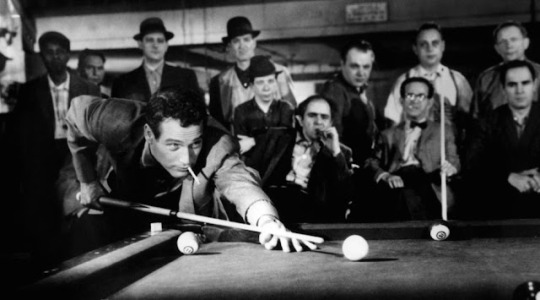
Paul Newman in The Hustler (Robert Rossen, 1961)
Cast: Paul Newman, Jackie Gleason, Piper Laurie, George C. Scott, Myron McCormick, Murray Hamilton, Michael Constantine, Stefan Gierasch, Clifford A. Pellow, Jake LaMotta, Gordon B. Clarke, Alexander Rose, Carolyn Coates, Carl York, Vincent Gardenia. Screenplay: Sidney Carroll, Robert Rossen, based on a novel by Walter Tevis. Cinematography: Eugen Schüfftan. Production design: Harry Horner. Film editing: Dede Allen. Music: Kenyon Hopkins.
You can't say The Hustler isn't educational: It made me Google the difference between pool and billiards. Otherwise, it stands as a direction the American film might have gone in the 1960s, after the breakup of the studios, the waning of anticommunist hysteria, and the weakening of Production Code enforcement. Instead, the movies went in the direction signaled by the Oscars for that year, in which Academy voters chose West Side Story (Robert Wise, Jerome Robbins) over The Hustler as best picture, indicating a trend toward big, bright entertainment rather than gritty, intense films of the sort that were being turned out in Europe and Japan during the 1950s and '60s. The Hustler seems more like a film from the 1970s than one of the better films of the 1960s. It did land Oscars for Harry Horner's production design and Eugen Schüfftan's cinematography, as well it should have. CinemaScope could be an unwieldy format, especially in black-and-white, but Schüfftan mastered it beautifully, working with director Robert Rossen to make the most of Horner's unglamorous and sometimes cramped settings. The camera sometimes gives us the full spread of a set and lets us search for the key figures in it: The introduction of Piper Laurie's Sarah is not a grand entrance or a tell-all closeup but an at first insignificant figure in a train station diner, gaining prominence only through the eyeline of Paul Newman's Fast Eddie Felson. Later, when Sarah returns to that diner, Eddie is seated at the far right of the frame, not front and center as you'd expect the protagonist of a movie to be. Pool, being a horizontal game, is more in line with the demands of CinemaScope, and it's here that Dede Allen's editing works particularly well. As for the actors, Newman, Laurie, George C. Scott, and Jackie Gleason all covered themselves with glory -- and Oscar nominations, which of course Scott declined. If I have reservations about The Hustler it's that the bluesy score by Kenyon Hopkins is laid on a little too thickly and that its story, hinging on a suicide and a redemption, strays to the edge of being contrived and melodramatic, but at least doesn't fall completely into happily ever after mode.
0 notes
Text
Allen Tate Wood interviewed: as a top UC leader in the 1960s he was a moderator at WACL in 1970 in Tokyo
youtube
Updated August 1, 2022
Allen Tate Wood wrote a book about his experiences in the Unification Church and has given many interviews over the decades. A selection of his work is available here:
Allen Tate Wood on Sun Myung Moon and the Unification Church
1. Interview at North Texas State University (Summer 1985)
2. Deconstructing Extremism in 21st Century America (c. 2014)
3. Interview with Walter Evans in the Texas Metroplex (1985)
4. Moonstruck: A memoir of my life in a cult – Allen Tate Wood with Jack Vitek (1979)
5. Defectors inside story: How the nickel and dime Moonies rake in $219 million
________________________________________
Edited auto translation:
“I thought we could rule the world,” said a former executive of the Unification Church in the United States about the reality of “electoral alliance” and “large amounts of funding”
[News feature]
TBS NEWS DIG
30 July 2022
A former executive of the Unification Church in the United States responded to a news feature and testified to the reason why the cult approached politics and the fact that it was paying politicians a lot.
■ “I’m Sun Myung Moon’s dog”
It is said that the donations in Japan were also used to acquire believers in the United States.
Allen Tate Wood, was an executive in the political branch of the Unification Church of the United States from the 1960s to the 1970s. He testified to the actual situation of the cult in response to the news feature.
Former Unification Church executive Allen Wood:
“Sun Myung Moon and others were trying to control the powers, to make them believe that the organization dominates the world. That’s why we make videos of the [top political leaders] and show them to young people.”
Mr. Wood himself was brainwashed through these lectures until he left.
The International Federation for Victory Over Communism (IFVOC), which was a political organization related to the Unification Church, held an event at the Nippon Budokan in 1970. Mr Wood was a moderator. Right-wing tycoon Ryoichi Sasagawa from Japan also spoke. Mr. Wood says he will never forget Mr. Sasagawa’s remarks.
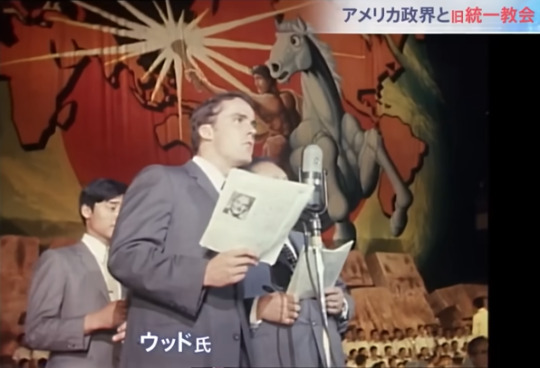
▲ Allen Tate Wood speaking at WACL in Tokyo.
Mr. Allen Wood:
“He (Sasagawa) struck his chest and said,‘I’m Sun Myung Moon’s dog.’ It was a surprising statement. The strongest person in Japan placed himself under Sun Myung Moon. At that time, I thought, “We can rule the world.”

▲ Sasagawa “right-wing tycoon” speaking at the 1970 WACL conference
■ Letter sent by Prime Minister Kishi to President Reagan ...
Furthermore, it is said that former Prime Minister Nobusuke Kishi, the grandfather of Shinzo Abe, had a close relationship with Sun Myung Moon. In October 1982, Prime Minister Kishi sent a congratulatory telegram to the mass wedding ceremony held in South Korea.
Prime Minister Kishi congratulatory telegram reading:
“I teach and educate based on heaven-centered ideals and beliefs. That is why I respect Sun Myung Moon from the bottom of my heart.”
This is a letter sent by Prime Minister Nobusuke Kishi to President Reagan in 1984, two years later.
“Today, I would like make a request to you, Mr. President. This request is about a person whom I believe you may be acquainted with, the Reverend Sun Myung Moon. Rev. Moon is now under unjust confinement. With your cooperation, I would like to ask that he be released by all means from his unfair imprisonment as soon as possible.”
In fact, when this letter was issued, Mr. Moon was imprisoned in the United States for [perjury, document forgery] and tax evasion. Prime Minister Kishi asked President Reagan to release Mr. Moon.
Kishi’s letter continues:
“My understanding of Rev. Moon is that he is a genuine man, staking his life on promoting the ideals of freedom and correcting [the mistakes of] communism. His existence is, and will be in the future, a rare, precious and indispensable one for the maintenance of freedom and democracy. I respectfully ask for your good decision on this case so that proper steps may be taken.”
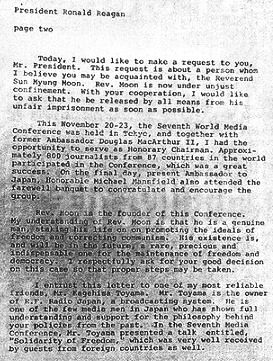
LINK to the full text
■ If you raise anti-communism ...
Following this request, Mr. Moon was not released, but eight years later, in 1992, Mr. Moon came to Japan for the first time after his imprisonment in the United States.
It is said that it was Shin Kanemaru, then vice president of the Liberal Democratic Party, who approached the government at this time. During Mr. Moon’s visit to Japan, he had a meeting with former Prime Minister Nakasone.
Former Prime Minister Yasuhiro Nakasone:
“That person (Mr. Sun Myung Moon) has a relationship like the Unification Church or the old Katsuko, and rather puts a wedge into the communist bloc. And puts in the air and light of the free world. I think it was done with such a consistent policy.”
Allen Wood, a former executive of the Unification Church in the United States, said that anti-communism increased the influence of the cult after the end of the Vietnam War in the 1970s.
Above all, the relationship with the Republican Party ...
Former Unification Church executive Allen Wood:
“President Reagan said,‘This is the only newspaper I read,’ while holding a copy of the Washington Times published by an affiliate of the cult. It’s the newspaper owned by Mr. Moon. It’s a newspaper for political propaganda. I was trying to get into politics. I was very successful in getting Republican politicians.”
Mr. Moon expressed his support for successive presidents in newspapers under his umbrella. Furthermore, in the election campaign ...
Former Unification Church executive Allen Wood:
“Reagan, Bush father and son, Trump, all received extensive support from the Unification Church. Believers raised funds and made door-to-door canvassing throughout the United States to expand their support. Bush Sr., said, “Without the Unification Church members, we wouldn’t have won the election.”
■ Approximately 130 million yen per speech
He also testified that big politicians were paid large fees when attending events and sending messages [to support the UC or related organizations such as the Universal Peace Federation].
Former Unification Church executive Allen Wood:
“When Bush finished his term as president and gave a lecture to South Korea, he was paid $1 million for each speech. He also paid $1 million for Reagan. This is amazing, because this money was taken from young people who were brainwashed and enslaved.”
Former President Trump also sent a video message to an event of a related organization, UPF, last September, and the connection with the Republican Party is still ongoing.
The former Unification Church has deepened its ties with the political world of Japan and the United States through election cooperation and large amounts of compensation. Mr. Wood ...
Former Unification Church executive Allen Wood:
“[Mr. Moon] said that if he couldn’t [gain people’s loyalty through] his ideology, he would buy loyalty with money.”
________________________________________
「我々は世界を支配できると思った」米・統一教会の元幹部が語った “選挙協力” と “高額報酬” の実態【報道特集】
TBS NEWS DIG
30 July 2022
アメリカ統一教会の元幹部が報道特集の取材に応じ、教団が政界に近づいた理由、そして政治家に多額の報酬を出していた実態などを証言した。
■『私は文(鮮明)氏の犬だ』
日本での献金はアメリカでの信者獲得にも使われたという。
1960年代から70年代にかけてアメリカ統一教会の政治部門の幹部だったアレン・ウッド氏。報道特集の取材に応じ、教団の実態を証言した。
アメリカ統一教会の元幹部アレン・ウッド氏
「文鮮明氏らは権力者たちを支配しようとしていました。信者に “組織が世界を牛耳っている” と信じ込ませるためです。そのために権力者たちのビデオを作成し、若者に見せるのです」
ウッド氏自身、脱会するまではこうした講演を通して洗脳されていったという。
1970年に日本武道館でおこなわれた統一教会と関連する政治団体「国際勝共連合」のイベント。ここでウッド氏は司会を務めた。日本からは右翼の大物・笹川良一氏も出席。ウッド氏は笹川氏の発言が忘れられないと話す。
アメリカ統一教会の元幹部アレン・ウッド氏
「彼(笹川)は胸をたたきながら『私は文(鮮明)氏の犬だ』と言いました。驚くべき発言でした。日本で最強の人物が自分を文氏の下に位置づけたのです。あの時、『我々は世界を支配できる』と思いました」
■岸元総理がレーガン大統領に送った親書には・・・
さらに、文鮮明氏と深い関係にあったのが、安倍晋三氏の祖父・岸信介元総理だという。1982年、韓国で行われた合同結婚式には岸元総理が祝電を送っていた。
岸元総理祝電代��
「天を中心にとした理想と信念のもとに指導し、教育しておられる。私が文鮮明先生を心より尊敬する所以であります」
これはその2年後の1984年、岸元総理がレーガン大統領に送った親書だ。
文書(岸信介)
「本日、大統領にお願いをしたいと思います。文(鮮明)尊師は現在、不当に収監されています。あなたのご協力のもと、何としてでも、一刻も早く、彼が不当な収監から解放されるよう、お願いいたします」
実は、この親書が出されたとき、文氏はアメリカで脱税の罪で収監されていた。岸元総理がレーガン大統領に文氏の釈放を依頼する内容だったのだ。
文書(岸信介)
「文尊師は、自由の思想を掲げ、共産主義の誤りを正すことに人生をかけている、誠実な男だと私は理解しております。彼の存在は、現在も将来も自由と民主主義の維持にとって、貴重で不可欠です」
■反共産主義を掲げると…
結果的には、釈放には至らなかったが8年後の1992年。文氏はアメリカでの実刑後、初めて来日した。
このときに政府に働きかけをしたのが、自民党の金丸信副総裁(当時)だったという。さらに来日中に、中曽根元総理と会談を行っていた。
中曽根康弘元総理
「あの人(文鮮明氏)は統一教会、あるいは昔の勝共というような関係で、むしろ共産圏の中へくさびを入れていくと。そして自由世界の空気、光を入れていくと。そういうような一貫した方針でやられたんではないかと思いますね」
アメリカ統一教会の元幹部アレン・ウッド氏は1970年代、ベトナム戦争の終結後、反共産主義を掲げることで教団の影響力が増したと話す。
中でも共和党との関係は…
アメリカ統一教会の元幹部アレン・ウッド氏
「レーガン大統領は教団の関連団体が発行するワシントン・タイムズを見せながら『私が読んでいる新聞はこれだけだ』と言いました。文氏がオーナーの新聞です。政治的プロパガンダのための新聞で、政界に入り込もうとしていました。共和党の政治家を取り込むという点では大いに成功しました」
傘下にある新聞で歴代大統領への支持を表明した。さらに選挙運動においては…
アメリカ統一教会の元幹部アレン・ウッド氏
「レーガン、ブッシュ親子、トランプ、その全員が統一教会の大々的な支援を受けました。信者が資金集めをし、全米各地で戸別訪問をして支持を広げました。父親のブッシュが『統一教会の信者等がいなければ、選挙での勝利はなかった』と発言していました」
■1回のスピーチで約1億3千万円
また大物政治家がイベントに出席したり、メッセージを送ったりする際には、多額の報酬が支払われていたことも証言した。
アメリカ統一教会の元幹部アレン・ウッド氏
「ブッシュが大統領の任期を終えて、韓国に講演に行ったときは1回のスピーチにつき100万ドル(約1億3千万円)を支払いました。レーガンにも1回100万ドル支払いました。これは凄いことです。なぜならこの金は洗脳されて奴隷となった若者たちから巻き上げたものだったからです」
去年9月には、関連団体のイベントにトランプ前大統領もビデオメッセージを送るなど、共和党とのつながりは現在も続いているという。
選挙協力や多額の報酬によって日本やアメリカの政界とつながりを深めた旧統一教会。ウッド氏は…
アメリカ統一教会の元幹部アレン・ウッド氏
「(文氏は)イデオロギーで心を掴めなければ金で買収するんだと言っていました」
______________________________________
Nobusuke Kishi wrote a letter to President Reagan to get Moon released from jail; he was in for perjury, document forgery and tax evasion in 1984
Former Japanese Prime Minister Nobusuke Kishi was Honorary Chairman at Moon’s 1984 World Media Conference
Allen Tate Wood on Sun Myung Moon and the Unification Church
The case of a mysterious death at a CARP training session in Japan. The 18 year-old student had been beaten.
#Allen Tate Wood#Unification Church#Universal Peace Federation#UPF#Sun Myung Moon#WACL#World Anti-Communism League#church history#nobusuke kishi#ryoichi sasakawa#reagan#anti-communism#unification church in japan#japanese church
0 notes
Text
Isn’t Everything Autobiographical?: Ethan Hawke In Nine Films And A Novel by Marya Gates
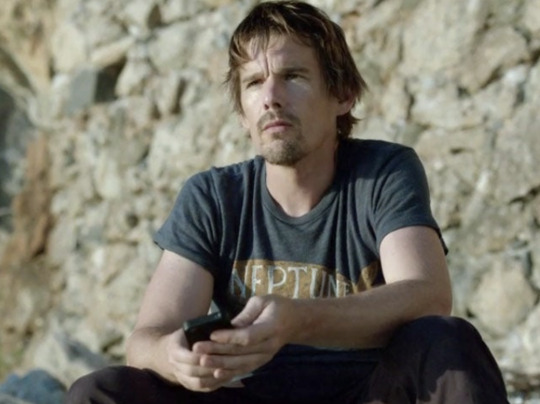
When asked during his first ever on-camera interview if he’d like to continue acting, a young Ethan Hawke replied, “I don’t know if it’s going to be there, but I’d like to do it.” He then gives a guileless shrug of relief as the interview ends, wiping imaginary sweat off his brow. The simultaneous fusion of his nervous energy and poised body language will be familiar to those who’ve seen later interviews with the actor. The practicality and wisdom he exudes at such a young age would prove to be a through-line of his nearly 40-year career. In an interview many decades later, he told Ideas Tap that many children get into acting because they’re seeking attention, but those who find their calling in the craft discover that a “desire to communicate and to share and to be a part of something bigger than yourself takes over, a certain craftsmanship—and that will bring you a lot of pleasure.”
Through Hawke’s dedication to his craft, we’ve also seen his maturation as a person unfold on screen. Though none of his roles are traditionally what we think of when we think of autobiography, many of Hawke’s roles, as well as his work as a writer, suggest a sort of fictional autobiographical lineage. While these highlights in his career are not strictly autofiction, one can trace Hawke’s Künstlerromanesque trajectory from his childhood ambitions to his life now as a man dedicated to art, not greatness.
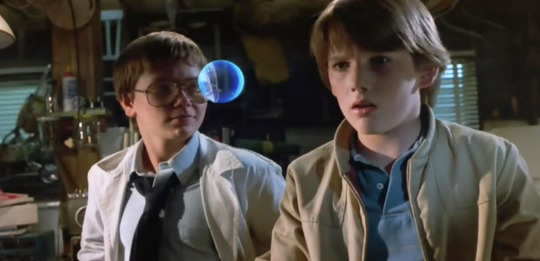
Hawke’s first two films, Joe Dante’s sci-fi fantasy Explorers with River Phoenix and Peter Weir’s Dead Poets Society with Robin Williams, set the tone for a diverse filmography filled with popcorn fare and indie cinema in equal measure, but they also served as touchstones in his development as person drawn to self-expression through art. In an interview with Rolling Stone’s David Fear, Hawke spoke about the impact of these two films on him as an actor. When River Phoenix, his friend and co-star in Explorers, had his life cut short by a drug overdose, it hit Hawke personally. He saw from the inside what Hollywood was capable of doing to young people with talent. Hawke never attempted to break out, to become a star. He did the work he loved and kept the wild Hollywood lifestyle mostly at arm’s length.
Like any good film of this genre, Dead Poets Society is not just a film about characters coming of age, but a film that guides the viewer as well, if they are open to its message. Hawke’s performance as repressed schoolboy Todd in the film is mostly internal, all reactions and penetrating glances, rather than grandiose movements or speeches. Through his nervy body language and searching gaze, you can feel both how closed off to the world Todd is, and yet how willing he is to let change in. Hawke has said working on this film taught him that art has a real power, that it can affect people deeply. This ethos permeates many of the characters Hawke has inhabited in his career.
In Dead Poets Society, Mr. Keating (Robin Williams) tells the boys that we read and write poetry because the human race is full of passion. He insists, “poetry, beauty, romance, love—these are what we stay alive for.” Hawke gave a 2020 TEDTalk entitled Give Yourself Permission To Be Creative, in which he explored what it means to be creative, pushing viewers to ask themselves if they think human creativity matters. In response to his own question, he said “Most people don’t spend a lot of time thinking about poetry, right? They have a life to live and they’re not really that concerned with Allen Ginsberg’s poems, or anybody’s poems, until their father dies, they go to a funeral, you lose a child, somebody breaks your heart, they don’t love you anymore, and all of the sudden you’re desperate for making sense out of this life and ‘has anyone ever felt this bad before? How did they come out of this cloud?’ Or the inverse, something great. You meet somebody and your heart explodes. You love them so much, you can’t even see straight, you know, you’re dizzy. ‘Did anybody feel like this before? What is happening to me?’ And that’s when art is not a luxury. It’s actually sustenance. We need it.”
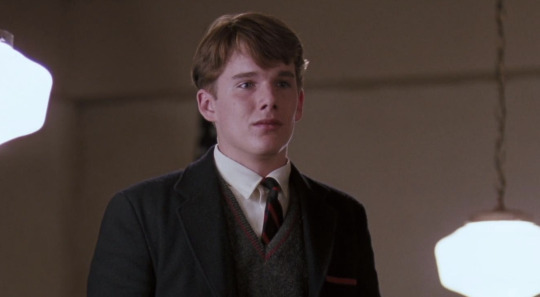
Throughout many of his roles post-Dead Poets Society, Hawke explores the nature of creativity through his embodiment of writers and musicians. Often these characters are searching for a greater purpose through art, while ultimately finding that human connection is the key. Without that human connection, their art is nothing.
We see the first germ of this attraction to portray creative people on screen with his performance as Troy Dyer in Reality Bites. As Troy Dyer, a philosophy-spouting college dropout turned grunge-band frontman in Reality Bites, Hawke was posited as a Gen-X hero. His inability to keep a job and his musician lifestyle were held in stark contrast to Ben Stiller’s yuppie TV exec Michael Grates. However in true slacker spirit, he isn’t actually committed to the art of music, often missing rehearsals, as Lelaina points out. Troy even uses his music at one point to humiliate Lelaina, dedicating a rendition of “Add It Up” by Violent Femmes to her. The lyrics add insult to injury as earlier that day he snuck out of her room after the two had sex for the first time. Troy’s lack of commitment to his music matches his inability to commit to those relationships in his life that mean the most to him.
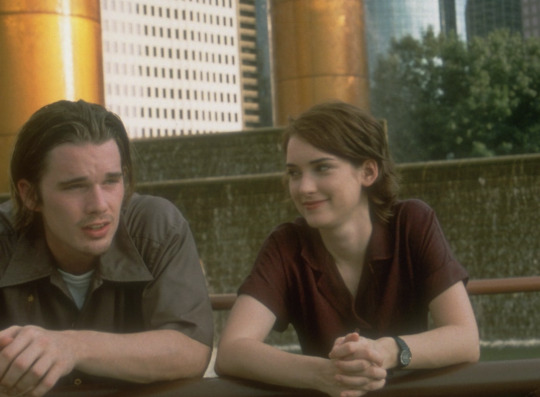
Reality Bites is also where he first positioned himself as one of the great orators of modern cinema.” Take this early monologue, in which he outlines his beliefs to Winona Ryder’s would-be documentarian Lelaina Pierce: “There’s no point to any of this. It’s all just a random lottery of meaningless tragedy and a series of near escapes. So I take pleasure in the details. You know, a quarter-pounder with cheese, those are good, the sky about ten minutes before it starts to rain, the moment where your laughter become a cackle, and I, I sit back and I smoke my Camel Straights and I ride my own melt.”
Hawke brings the same intense gaze to this performance as he did to Dead Poets Society, as if his eyes could swallow the world whole. But where Todd’s body language was walled-off, Troy’s is loud and boisterous. He’s quick to see the faults of those around him, but also the good things the world has to offer. It’s a pretty honest depiction of how self-centered your early-20s tend to be, where riding your own melt seems like the best option. As the film progresses, Troy lets others in, saying to Lelaina, “This is all we need. A couple of smokes, a cup of coffee, and a little bit of conversation. You, me and five bucks.”
Like the character, Hawke was in his early twenties and as he would continue to philosophize through other characters, they would age along with him and so would their takes on the world. If you only engage with anyone at one phase in their life, you do a disservice to the arc of human existence. We have the ability to grow and change as we learn who we are and become less self-centered. In Hawke’s career, there’s no better example of this than his multi-film turn as Jesse in the Before Trilogy. While the creation of Jesse and Celine are credited to writer-director Richard Linklater and his writing partner Kim Krizan, much of what made it to the screen even as early as the first film were filtered through the life experiences of Hawke and his co-star Julie Delpy.
In a Q&A with Jess Walter promoting his most recent novel A Bright Ray of Darkness, Hawke said that Jesse from the Before Trilogy is like an alt-universe version of himself, and through them we can see the self-awareness and curiosity present in the early ET interview grow into the the kind of man Keating from Dead Poets Society urged his students to become.
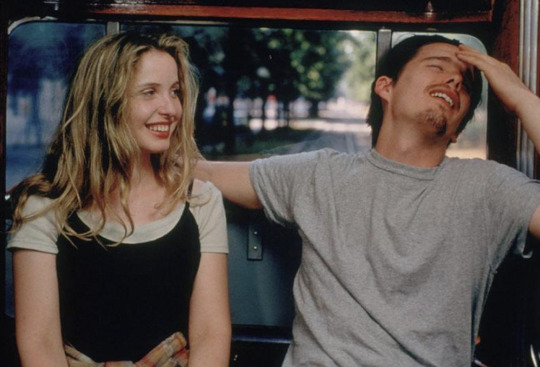
In Before Sunrise, Hawke’s Jesse is roughly the same age as Troy in Reality Bites, and as such is still in a narcissistic phase of his life. After spending several romantic hours with Celine in Vienna, the two share their thoughts about relationships. Celine says she wants to be her own person, but that she also desperately wants to love and be loved. Jesse shares this monologue, “Sometimes I dream about being a good father and a good husband. And sometimes it feels really close. But then other times it seems silly, like it would ruin my whole life. And it’s not just a fear of commitment or that I’m incapable of caring or loving because. . . I can. It’s just that, if I’m totally honest with myself, I think I’d rather die knowing that I was really good at something. That I had excelled in some way than that I’d just been in a nice, caring relationship.”
The film ends without the audience knowing if Jesse and Celine ever see each other again. That initial shock is unfortunately now not quite as impactful if you are aware of the sequels. But I think it is an astute look at two people who meet when they are still discovering who they are. Still growing. Jesse, at least, is definitely not ready for any kind of commitment. Then of course, we find out in Before Sunset that he’s fumbled his way into marriage and fatherhood, and while he’s excelling at the latter, he’s failing at the former.
As in Reality Bites, Hawke explores the dynamics of band life again in Before Sunset, when Jesse recalls to Celine how he was in a band, but they were too obsessed with getting a deal to truly enjoy the process of making music. He says to her, “You know, it's all we talked about, it was all we thought about, getting bigger shows, and everything was just...focused on the future, all the time. And now, the band doesn't even exist anymore, right? And looking back at the... at the shows we did play, even rehearsing... You know, it was just so much fun! Now I'd be able to enjoy every minute of it.”
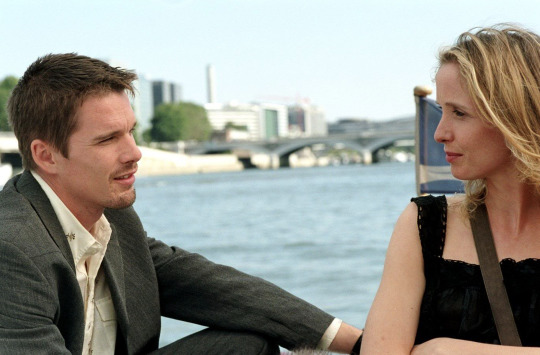
The filming of Before Sunset happened to coincide with the dissolution of Hawke’s first marriage. And while these films are not autobiographical, everyone involved have stated that they’ve added personal elements to their characters. They even poke fun at it in the opening scene when a journalist asks how autobiographical Jesse’s novel is. True to form, he responds with a monologue, “Well, I mean, isn’t everything autobiographical? I mean, we all see the world through our own tiny keyhole, right? I mean, I always think of Thomas Wolfe, you know. Have you ever seen that little one page note to reader in the front of Look Homeward, Angel, right? You know what I'm talking about? Anyway, he says that we are the sum of all the moments of our lives, and that, anybody who sits down to write is gonna use the clay of their own life, that you can’t avoid that.”
While Before Sunset was shot in 2003, released in 2004 and this monologue refers to the fictional book within the trilogy entitled This Time, Hawke would take this same approach more than a decade later with his novel A Bright Ray of Darkness.
In the novel, Hawke crafts a quasi-autobiographical story, using his experience in theater to work through the perspective he now has on his failed marriage to Uma Thurman. Much like Jesse in Before Sunset, Hawke is reluctant to call the book autobiographical, but the parallels to his own divorce are evident. And as Jesse paraphrased Wolfe, isn’t everything we do autobiographical? In the book, movie star William Harding has blown up his seemingly picture-perfect marriage with a pop star by having an affair while filming on location in South Africa. The book, structured in scenes and acts like a play, follows the aftermath as he navigates his impending divorce, his relationship with his small children, and his performance as Hotspur in a production of Henry IV on Broadway.
Throughout much of the novel, William looks back at the mistakes he made that led to the breakup of his marriage. He’s now in his 30s and has the clarity to see how selfish he was in his 20s. Hawke, however, was in his forties while writing the book. Through the layers of hindsight, you can feel how Hawke has processed not just the painful emotional growth spurt of his 20s, but also the way he can now mine the wisdom that comes from true reflection. Still, as steeped as the novel is in self-reflection, it does not claim to have all the answers. In fact, it offers William, as well as the readers, more questions to contemplate than it does answers.

The wisdom to know that you will never quite understand everything is broached by Hawke early in the third film in the Before Trilogy, 2013’s Before Midnight. At this point in their love story, Jesse’s marriage has ended and he and Celine are parents to twin girls. Jesse has released two more books: That Time, which recounts the events of the previous film, and Temporary Cast Members of a Long-Running But Little Seen Production of a Play Called Fleeting. Before Midnight breaks the bewitching spell of the first two films by adding more cast members and showing the friction that comes with an attempt to grow old with someone. When discussing his three books, a young man says the title of his third is too long, Jesse says it wasn’t as well loved, and an older professor friend says it’s his best book because it’s more ambitious. It seems Linklater and company already knew how the departure of this third film might be regarded by fans. But it is this very departure that shows their commitment to honestly showing the passage of time and our relationship to it.
About halfway through the film Jesse and Celine depart the Greek villa where they have been spending the summer, and we finally get a one-on-one conversation like we’re used to with these films. In one exchange, I feel they summarize the point of the entire trilogy, and possibly Hawke’s entire ethos:
Jesse: Every year, I just seem to get a little bit more humbled and more overwhelmed about all the things I’m never going to know or understand.
Celine: That’s what I keep telling you. You know nothing!
Jesse: I know, I know! I'm coming around!
[Celine and Jesse laugh.]
Celine: But not knowing is not so bad. I mean, the point is to be looking, searching. To stay hungry, right?
Throughout the series, Linklater, Delpy, and Hawke explore what they call the “transient nature of everything.” Jesse says his books are less about time and more about perception. It’s the rare person who can assess themselves or the world around them acutely in the present. For most of us, it takes time and self-reflection to come to any sort of understanding about our own nature. Before Midnight asks us to look back at the first two films with honesty, to remove the romantic lens with which they first appeared to us. It asks us to reevaluate what romance even truly is.

Hawke explores this same concept again in the 2018 romantic comedy Juliet, Naked. In this adaptation of the 2009 Nick Hornby novel, Hawke plays a washed-up singer-songwriter named Tucker Crowe. He had a big hit album, Juliet, in the early ‘90s and then disappeared into obscurity. Rose Bryne plays a woman named Annie whose longtime boyfriend Duncan is obsessed with the singer and the album, stuck on the way the bummer songs about a bad breakup make him feel. As the film begins, Annie reveals that she thinks she’s wasted 15 years of her life with this schmuck. This being a rom-com, we know that Hawke and Byrne’s characters will eventually meet-cute. What’s so revelatory about the film is its raw depiction of how hard it is for many to reassess who they really are later in life.
Duncan is stuck as the self-obsessed, self-pitying person he likely was when Annie first met him, but she reveals he was so unlike anyone else in her remote town that she looked the other way for far too long. Now it’s almost too late. By chance, she connects with Crowe and finds a different kind of man.
See, when Crowe wrote Juliet, he also was a navel-gazing twentysomething whose emotional development had not yet reached the point of being able to see both sides in a romantic entanglement. He worked through his heartbreak through art, and though it spoke to other people, he didn’t think about the woman or her feelings on the subject. In a way, Crowe’s music sounds a bit like what Reality Bites’s Troy Dyer may have written, if he ever had the drive to actually work at his music. Eventually, it’s revealed that Crowe walked away from it all when Julie, the woman who broke his heart, confronted him with their child—something he was well aware of, but from which he had been running away. Faced with the harsh reality of his actions and the ramifications they had on the world beyond his own feelings, he ran even farther away from responsibility. In telling the story to Annie, he says, “I couldn’t play any of those songs anymore, you know? After that, I just... I couldn’t play these insipid, self-pitying songs about Julie breaking my heart. You know, they were a joke. And before I know it, a couple of decades have gone by and some doctor hands me... hands me Jackson. I hold him, you know, and I look at him. And I know that this boy. . . is my last chance.”
When we first meet Crowe, he’s now dedicated his life to raising his youngest son, having at this point messed up with four previous children. The many facets of parenthood is something that shows up in Hawke’s later body of work many times, in projects as wholly different as Brooklyn’s Finest, Before Midnight, Boyhood, Maggie’s Plan, First Reformed, and even his novel A Bright Ray of Darkness. In each of these projects, decisions made by Hawke’s characters have a big impact on their children’s lives. These films explore the financial pressures of parenthood, the quirks of blended families, the impact of absent fathers, and even the tragedy of a father’s wishes acquiesced without question. Hawke’s take on parenthood is that of flawed men always striving to overcome the worst of themselves for the betterment of the next generation, often with mixed results.
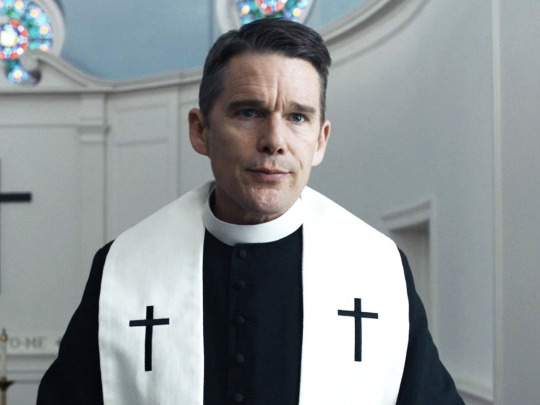
Where Juliet, Naked showed a potential arc of redemption for a father gone astray, First Reformed paints a bleaker portrait. Hawke plays Pastor Toller, a man of the cloth struggling with his own faith who attempts to counsel an environmental activist whose impending fatherhood has driven him to suicidal despair. Toller himself is struggling under the weight of fatherhood, believing he sent his own son to die a needless death in a morally bankrupt war. Sharing the story, he says “My father taught at VMI. I encouraged my son to enlist. It was the family tradition. Like his father, his grandfather. Patriotic tradition. My wife was very opposed. But he enlisted against her wishes. . . . Six months later he was killed in Iraq. There was no moral justification for this conflict. My wife could not live with me after that. Who could blame her? I left the military. Reverend Jeffers at Abundant Life Church heard about my situation. They offered me a position at First Reformed. And here I am.” How do we carry the weight of actions that affect lives that are not even our own?
If Peter Weir set the father figure template in Dead Poets Society, and Paul Schrader explored the consequences of direct parental influence on their children’s lives, director Richard Linklater subverts the idea of a mentor-guide in Boyhood, showing both parents are as lost as the kid himself. When young Mason (Ellar Coltrane) asks his dad (Hawke) what’s the point of everything, his reply is “I sure as shit don’t know. Nobody does. We’re all just winging it.” As the film ends, Mason sits atop a mountain with a new friend he’s made in the dorms discussing time. She says that everyone is always talking about seize the moment—carpe diem!—but she thinks it’s the other way around. That the moments seize us. In Reality Bites, Troy gets annoyed at Lelaina’s constant need to “memorex” everything with her camcorder, yet Boyhood is a film about capturing a life over a 12-year period. The Before Trilogy checks in on Jesse and Celine every nine years. Hawke’s entire career. in fact, has captured his growth from an awkward teen to a prolific artist and devoted father, a master of his craft and philosopher at heart.

#ethan hawke#boyhood#before trilogy#before midnight#before sunset#before sunrise#reality bites#first reformed#dead poets society#a bright ray of darkness#film writing#film essay#musings#oscilloscope laboratories
139 notes
·
View notes
Text
Something New Has Been Added: Inside Tex Avery’s Madcap Animated Universe By Donald Liebenson
“The secret in animating is first to have an everlasting sense of humor, next to be able to see the commonplace in a funny way and most important of all, to be able to sketch your idea so that the other person will think it's funny."—Tex Avery, The Dallas Morning News, 1933
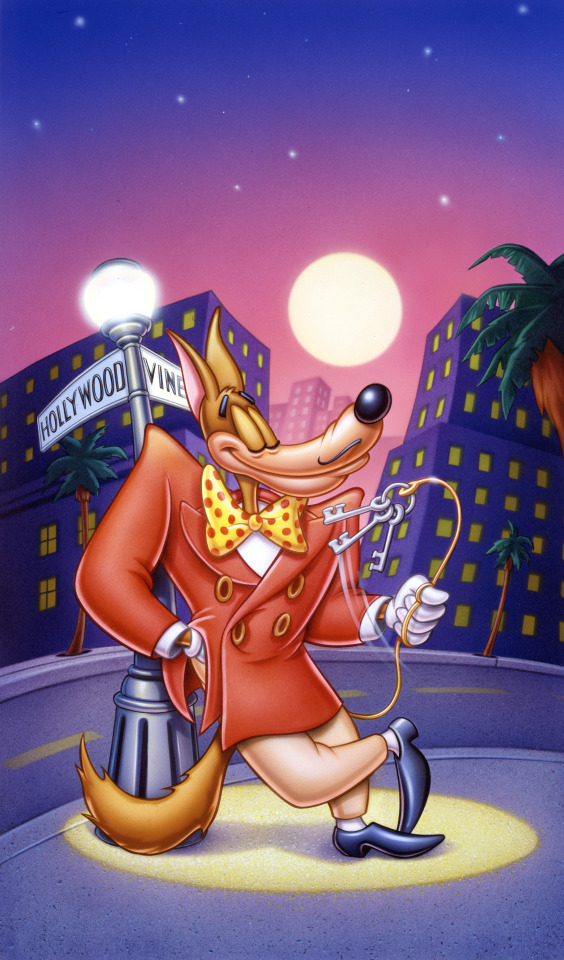
At the start of Fred “Tex” Avery’s RED HOT RIDING HOOD (‘43), the Wolf, Red Riding Hood and even Grandma rebel against a traditional rendering of the classic fairy tale and threaten to quit the cartoon right then and there. “Every cartoon studio in Hollywood has done it this way,” Red complains. “I’m pretty sick of it myself,” Grandma chimes in. And just like that, something new had been added, with a cat-calling, zoot-suit-bedecked Wolf cruising Hollywood Blvd.; Red Hot Riding Hood (aka that Sweetheart of Swing) knockin’ ‘em dead at a Hollywood night club; and a slang-slinging Grandma (“Hiya cousin, what’s buzzin?’”) waiting for a wolf of her own in her penthouse digs.
RED HOT RIDING HOOD kicks off TCM’s early morning tribute to Tex Avery, which will easily be the funniest thing you see all day. The cartoons will be preceded by John Needham’s British documentary TEX AVERY: KING OF CARTOONS (‘88). It is an ideal primer into the Avery-verse that charts his legendary career from high school cartoonist through his tenures with Walter Lantz Productions, Warner Bros. and MGM. Along with a generous sampling of clips from his Warner Bros. and MGM cartoons, there are priceless interviews with equally legendary colleagues such as Chuck Jones, Heck Allen and Mike Lah, along with June Foray, the Queen of Cartoons and Joe Adamson, who wrote the essential book, also titled Tex Avery: King of Cartoons. (Coincidence, isn’t it?)
Needham told TCM he was encouraged to make the documentary by Chuck Jones, whom Needham had profiled for the BBC arts series, Omnibus. “He simply said, ‘We should make a film about Tex,” he said. As an Avery fan himself, Needham was all in. “I think it’s his ability to take a gag to the extremes and then take it further and then take it even further,” he said. “Chuck said that he could never copy Tex because he didn’t have a clue what Tex was doing, he just knew that he was a genius. I’m sure I don’t know either, but what he did was incredibly funny.”
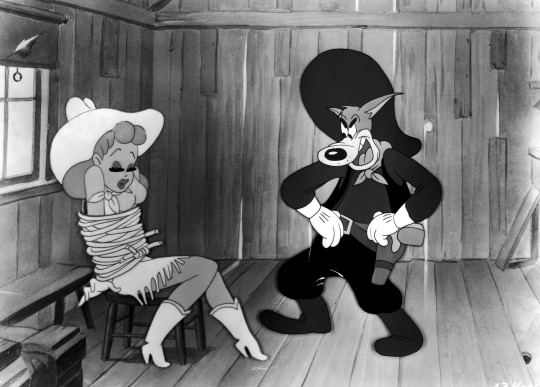
The seven cartoons included in the TCM tribute meet the “incredibly funny” standard. They were produced for MGM. These are not as well known or as widely seen as his cartoons for Warner Bros., where, most notably, Avery directed A WILD HARE (’40), the cartoon that established Bugs Bunny’s brash personality. Avery was an outlier at the tony studio that boasted “more stars than there are in the heavens.” MGM did make sparkling and sophisticated romantic comedies directed by the likes of George Cukor and Ernst Lubitsch, but MGM was where clowns went to die.
Buster Keaton wrote in his memoir that signing with MGM was “the worst mistake” of his career. THE CAMERMAN (’28) was an auspicious beginning, but gradually, Keaton lost the lion’s share of his creative control, suffered studio interference and was partnered with Jimmy Durante. The Marx Brothers’ association with the studio likewise began promisingly with A NIGHT AT THE OPERA (‘35), but soon the iconoclastic highs of the brothers’ Paramount films were but a dim memory and the brothers were relegated to playing second fiddle to insipid romantic leads like Kenny Baker and Florence Rice in AT THE CIRCUS (‘39).
But MGM could not tame Tex Avery. Or perhaps studio execs didn’t think animation was worth the time and trouble to meddle with, allowing him to work unimpeded. The best of the cartoons he made for the studio between 1942-55 put the “mad” in madcap, if that’s your idea of a good time. In his book, Adamson observes: “No artist, in any century, on any continent, in any medium, has ever succeeded in creating his own universe as thoroughly and overwhelmingly as Tex Avery.”
You might say that a Tex Avery cartoon is like that proverbial box of chocolates; you never know what you’re going to get. “Say, what kind of a cartoon is this gonna be, anyway?” asks the title character in SCREWBALL SQUIRREL (‘44), another of the Avery 7 to be featured in TCM’s mini-Avery-palooza. Well, it’s NOT going to be a charming Disney-esque romp with adorable forest creatures. Screwball Squirrel sees to that when he takes one of them behind a tree and violently disposes of him, assuring the audience, “The funny stuff will start as soon as the phone rings.”
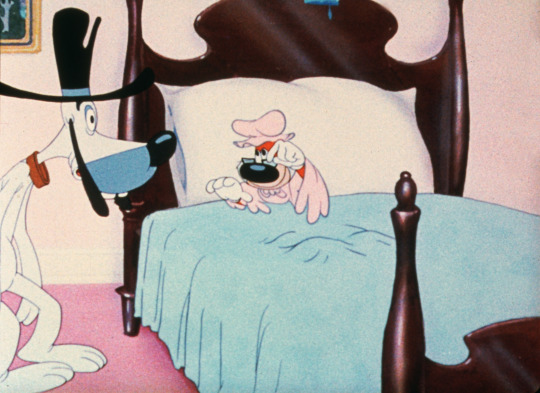
BAD LUCK BLACKIE and KING-SIZE CANARY, two masterpieces that are highlights of TCM’s Avery cartoon block, break all rules of the physical world and nature. In the former, a black cat brings instant bad karma each time he crosses the path of a bullying bulldog. At one point, the unfortunate pooch must dodge a succession of falling objects that escalate from a sink to a battleship. In the latter, a chase between a cat, mouse and dog escalates to gigantic proportions thanks to a bottle of Jumbo Gro.
What critic James Agee wrote about the Marx Brothers also applies to Avery in that even lesser Tex is better worth seeing than most other things I can think of. SYMPHONY IN SLANG (’51) is a succession of silly sight gags inspired by a hipster’s arrival at the Pearly Gates. He tells his life story to a befuddled Noah Webster, who pictures literal translations to such phrases as, “I was born with a silver spoon in my mouth,” “It was raining cats and dogs” and “I died laughing.”
SCREWBALL SQUIRREL features some great self-referential gags, such as the title character peeking ahead to the next scene to figure out what to do next. But the character was so obnoxious that he was actually killed off at the end of his fifth, and final, cartoon.
Avery’s influence is vast. When in THE LITTLE MERMAID (‘89), Sebastian’s jaw drops like an anvil when he spies Ariel nursing an injured Prince Eric, that’s a classic Tex Avery take. THE MASK (‘94) pays direct homage to RED HOT RIDING HOOD when Jim Carrey’s Mask man is undone by nightclub chanteuse Cameron Diaz. And the Tex Avery force is strong in Animaniacs’ helter-skelter pacing and fourth-wall breaking.
But there is nothing like the real thing. No one made cartoons that were loonier. The secret? As Avery told Joe Adamson, he didn’t think in terms of the age of his audience: “I tried to do something I thought I would laugh at if I were to see it on the screen.”
#Tex Avery#cartoons#classic#Little Mermaid#Animaniacs#TCM#TCMFF#Turner Classic Movies#Donald Liebenson#TCM Classic Film Festival#animation
223 notes
·
View notes
Text
Some of my favorite “coming out” “scenes”
Or not-coming-out but more like canon-implications-that-basically-confirm-a-queer-character without a coming out speech. I’m bored with coming out speeches/scenes, “marketed sexuality”, and forced coming out/gossiped coming out. This list is from a mix of mostly podcasts, but also books/movies/TV/games.
Last updated Aug 2022.
Established queer couple from their introduction, no coming out needed:
Tiffany & Keisha (Blood Crow Stories)
Buddy/Vespa, Quanyii/Caroline (The Penumbra Podcast)
Deena & Sam, Sarah Fier & Hannah Miller (Fear Street series)
Zelda & Pat (Mission Rejected)
Jason & Lucas Cawfield (The Glass Appeal)
Cherry & Vesta (Fuck Humans)
Meydinyor & Aule (Hulm)
Feltina & Humph (Fall of the House of Sunshine)
Sam/Allen, Anna/Maria, Bill/Robert (Sheridan Tapes)
Tommy & David (Putting 2 & 2 Together)
Emmy & Jo (Trials of Apollo: The Dark Prophecy)
Strone/Chipwick/Rel (Hubris round 5 ep 4)
Obvious life circumstance implications:
Wyatt Whaley (Blood Crow Stories)- has period products.
Frankie Meeks (The College Tapes)- said he changed his name.
Elle (Heartstopper) - changed from boys to girls school.
Apollo (Trials of Apollo) - OG!Apollo’s various mythology lovers + adds more male/female love interests
Cast of Surrender Your Sons- they’re at a conversion therapy camp
The Flame cast- owner of a gay bar, all the main characters are lesbian
Gay Future- it’s literally a gay future
Clay (How I Died)- wears a binder
Ethan McBride (Killing Spree)- gay porn stash
Most of Last Night at the Telegraph Club- attendees of a dyke bar
Conversation confirmations:
Machie/Rez (Vacant Arcadia) - They have FOUR songs dedicated to flirting with computer programming. Can’t get any gayer than that.
Piper Lee (Null/Void) - “I’m in a closet.” “Thanks for coming out, but is this the right time?” “No I’m actually hiding in a closet, but not the homophobic kind. Someone is about to catch me.” My favorite.
Mike Walters (WOE.BEGONE)- challenge featuring his exboyfriend
Nick Waters (Archive 81) - question challenge about ex-boyfriends
Monty Montague (Montague sibling series)- listing his dating history + flirts with everyone
Robin Buckley (Stranger Things) - implies her crush on Tammy Thompson & Steve/the audience just gets it
Zachary Ying (Zachary Ying & the Dragon Emperor) - “I don’t like girls!”
Lucius (Our Flag Means Death)- "I lied to my mom that I liked girls!”
Reyna (Trials of Apollo) - laughs her head off & complains that people think she needs a romantic partner
Quincy (Blood Crow Stories) - flirts with guys & girls + Travis: “Omg sis, I don’t care who you sleep with.”
Zach (Keep It Steady podcast) - rants about his obvious crush on Gabe
Characters from Shimanami Tasogare by Yuhki Kamatani. Ok I mentioned that BL/GL won’t be included, however this one is a special mention because its more like a LGBT+ manga than a BL/GL. There’s several queer characters at different stages of their life and while several of the coming out or reveals (if they’ve already come out long ago) were in homophobic situations, they were understandable and realistic. I’d say my favorite unfortunate “coming out” is Utsumi‘s arc and fave positive coming out is Haruko & Saki’s arc. I say arcs bc several characters have to come out multiple times, which is really realistic :O
Action confirmations:
Kyoshi & Rangi (Avatar Kyoshi novels) - confess & kiss
Rupert & Amir (The Two Princes) - confess & kiss
Pangla (Fall of the House of Sunshine)- transitions during an episode
Juno Steel (Penumbra Podcast)- kisses Peter, addressed as both guy & lady
Angel & Bast (Fuck Humans) - they hook up
Caitlyn Kiramman (Arcane)- in a brothel with a female prostitute
Aiden Jamison (Swipe Right for Murder)- goes on DirtyPaws
Ellie Williams (The Last of Us) - kisses Riley
Zagreus (Hades, game) - hooks up with Thanatos & Megara
Travis (Blood Crow Stories) - hooks up with guys
Conrad & Rudyard (The Vanishing Act) - confess & kiss
Paul (Moonface)- hooks up with several guys
Rita (Penumbra) - open to anyone at brothel + flirts with Yasmin
Jake Wheeler (Chucky TV 2021) - ok technically the actual “gay” confirmation was across 3 heated arguments that included the f-slur, but the first official signs was Jake very obviously oogling Devon.
Syd Carter (Proxy) - the initial outing was unpleasant but made sense in context, but the better reveal was kissing Knox
Character referred by neo-pronouns/nonbinary/multiple pronouns immediately:
Many many many characters from Under the Electric Stars
Several characters from Vacant Arcadia
Several characters from The Penumbra Podcast
Several characters from Electromancy
Several characters from Jar of Rebuke
Dr Kim (How I Died)
Ben Bernard (The College Tapes)
Alex Fuentes (Skillset Podcast)
Krejjh (Strange Case of Starship Iris)
Prince$$ (Blood Crow Stories)
Alright thats it for now! I’ll add more later. Obviously I skipped the entire BL/GL genre in anime/manga/visual novels because those are all just givens.
#audio dramas#books#movies#games#lgbt#queer characters#lgbt characters#podcasts#podcast list#recommendation list
4 notes
·
View notes
Text
Far away - P. Parker.
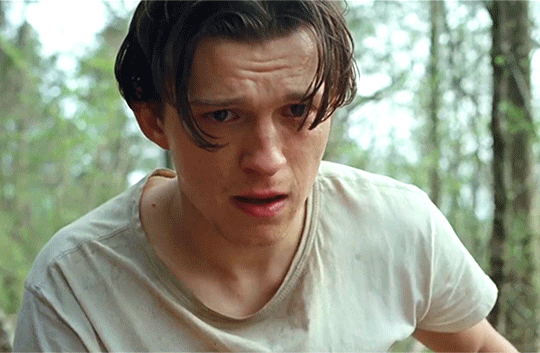
This is an overload of angst, inspired by - and named after - ‘Far Away’ by Nickleback (yes, I’m a nickleback fan, I’m sorry). There WILL be a part two.
No this was not requested, and the gif is not mine. I hope y’all like it!
Original story by sarcastically-defensive17
WARNING: the contents of this story may be triggering to some readers. This story contains: domestic arguing, mentions of familial death and guilt, mentions of violence, mentions of abandonment, pregnancy, Peter and Y/N both being bitches, and all round angst. Please do not read if this may cause you any offense or trigger you in any way
It had been near 2 months since she had seen Peter. In person, that is.
The relationship between Y/F/N and Peter Parker was an odd one. Best friends through middle school, they were like two peas in a pod. Inseparable to the point where Y/N was adopted as an honorary Parker.
In high school, tragedy struck both of them. Y/N’s mother left, divorcing her father and leaving for California. Ben Parker died, shot by a lawless mugger when he was out looking for Peter. Peter blamed himself. Y/N fell in with the popular crowd, looking for any chance to distract herself from her overwhelming anger. Peter became distracted, finding any and every excuse to escape school once he began an internship with Mr. Tony Stark. Peter and Y/N often vied for the attention of Liz Allen, their crushes on the woman making their anger with one another overflow whenever they were in each other’s presence.
In University, they reunited and decided to start over. One thing led to another and they quickly became lovers, with distance between.
Until she fell pregnant. 7 months into their relationship, she found out about the new life growing inside of her. She was ecstatic, but full of nerves. Peter was anxious, worried for his child and the woman he loved.
Life as Spider-Man was hectic. He grappled with the thought of her getting hurt because of him every day. He had seen the danger that had come to Pepper, what happened to Ben, Ned, almost everybody he held dear.
Her first trimester went by with a rocky start. Y/N fought with her own fears, wondering how she could be a mother when her own wasn’t there to teach her. Nevertheless, she loved peter. She gave her all to him, but he was distant, growing more so every day.
She didn’t want him to go. He had risked his life - and their relationship - far too many times in the past year. He knew it was a risk, he knew his life would be in danger every second he was undercover, but he still went.
Then Tony told him to go undercover.
She was in New York, about to hit her third trimester, and he was in Belgium, unaware of the life growing inside of her.
He broke the news to her of his undercover mission with Clint three nights before he left. That same day, he had missed their scheduled appointment to find out the sex of their baby.
To say there was an argument would be an understatement.
She had printed the picture up, gotten a card for him, and left it waiting on their shared bed for when he got home. Spider-Man was only half of his job, the other half was spent with incredibly long hours at the lab with Tony working on whatever their incredible minds could think of that day.
Sometimes she felt as if their relationship had been mostly made up of her waiting on him.
He had walked in the door, moving to gather his stuff together from the spare room they had in their apartment that housed his gear. They were set to turn it into a nursery.
He told her of the mission as soon as he walked in, immediately erasing the excited grin from her features.
“How long is it going to take?” She fought the nerves from building, knowing that the longest mission he had been on before had been two weeks. Tony told her when her and peter moved in together that Peter wouldn’t be expected to go on a mission any longer than that.
Peter sighed, grabbing a large bag. He had to head back for debriefing, and training before the mission began. He didn’t expect to be back home before he had to leave. He didn’t want to leave her, but he had came to terms with the fact that he was Spider-Man before he was Peter.
“I don’t know, Y/N. At least a month and a half-“
“You can’t go!” She interrupted.
Peter chuckled softly, paying no mind to her growing anger. “Yeah, I do. Clint and I are the only ones that can go unnoticed. Nobody has seen my face, and Clint has done so many undercover missions. He’s practically living a new life every month.” He hustled around the room once again, grabbing every box of spare cartridges for his web shooters. “After all, this is what I do.”
Y/N scoffed. Recently, he had been putting everything before his family. He missed their anniversary in favour of working on a new web formula with Tony. Her birthday was spent alone with nothing but a 10 minute phone call from him because he was on patrol. Now, he had missed the day they had both been looking forward to for months.
She didn’t want to be selfish, she loved him fiercely, but his child needed him too. Every time he left the house with his suit, she feared for his life. Now, she had the baby to think about too. It was about more than just her.
She tried to push down her feeling that he didn’t even want to be a father.
Peter rolled his eyes at her scoff. “Y/N. I’m Spider-Man. That means that I need to help people, not just be here when you want me to.”
“That’s not what it is, Peter!” She exclaimed, eyes widening at his words. “I’m due in three months!”
He rubbed his hand down his face, huffing. “Y/N, can you just stop? Please? I need to go, and you’re not going to stop me. This is my job. Tony and May are here.”
“I thought your ‘job’ was spending hours with Stark and forgetting that I exist,” she snarled, making quotation signs with her hands. Tensions had been high between them lately, the past two weeks turning their house into a war zone. She was sure her news would bring a happier note, but the news was all but forgotten at the time. “We are your family, Peter!
His eyes were blazing with anger, his bags in his hands as he slipped past her to the door. He spared a look at her swollen stomach, almost sadly.
“Peter!” She called after him as he ignored her, stomping through their apartment.
She tried a few more times, latching onto his hand as he got closer to the door.
“Please, don’t go. The last mission you were on, you came back with four broken ribs and a concussion. I can’t lose you, we need you,” he refused to look at her.
“You won’t lose me, y/n. I’m an adult, I don’t need you to babysit me. Enough, I need to go. This is about more than just you, so please cut the crap,” he sighed at her, anger pulling his brows down and crinkling his nose in the way she had memorized.
Y/N had struggled with trust issues since before her mother left, and she had used all of her courage to trust peter, but the anger and fear were too much, her mouth working without instruction. “Why don’t you just fucking admit that you don’t want to have a family, Peter? You’ve made it perfectly obvious that the baby means nothing to you!”
That set him off. “Grow the fuck up, Y/N. This may shock you, but this isn’t about you, for once! Don’t you ever say that I don’t want this child.”
She scoffed at him again, spitting, “you couldn’t even bother to fucking show up for the sonogram today. Our baby is fine by the way, not that it matters, obviously.”
His laugh was evil. “You’re so fucking perfect, aren’t you? I’m sorry that I have a job, unlike you. I fucking save people, every day. I don’t have time to hold your hand through fucking everything because you’re a narcissist!”
She was taken aback by his shout, her next words flying out without the filter between her brain and mouth coming into action. “You know what? Fine!” She shoved his arm away. “If you walk out that door, don’t fucking bother coming back. You don’t care that we need you here, so don’t even bother being apart of this.”
“You’re kicking me out because I’m going on a mission?” His laugh was sarcastic, almost full of disbelief. “You really are selfish, Y/N.” He wrenched the door open with his free hand, not bothering to kiss her like he always did before a mission. No further words were exchanged, only a longing glance at her stomach and a fleeting look in her eyes.
She was left in the quiet apartment.
She trudged to their room - her room, now - fighting the tears threatening to fall. The photo of their baby was sitting carefully on the bed right next to the card.
The dam broke, tears streamed down her face and sobs ripped from her chest.
She picked up the photo of herself and Peter from when they announced their pregnancy. He was on his knees in front of her, hands on either side of her small bump, smiling brightly with love in his eyes, and she was looking at him the same way.
She flung it against the wall, watching the glass shatter from the frame and fall to the ground.
She pulled the card up from its spot, reading over the words inside.
‘I have loved you all along, Peter. Thank you for beginning this journey with me. We’re so far from where we began.
I know that our little girl will be as perfect as you are.
All my love, Y/N.”
The two months has passed agonizingly slow. Her heart wrenched each day when she woke to an empty bed. Their baby grew steadily, now a month away from making her entrance.
Her new routine had been to watch the news every morning before her daily run. Her work hours had decreased, but she filled her schedule to clear her head, in order to stop the pain.
She hadn’t spoken to peter since he left, she barely even knew where he was.
Jedd Walters was on the news, his booming voice echoing through her house as she watched from the kitchen.
“This just in,” his voice grew more urgent. “After months of being undercover, we are saddened to report that beloved Avengers, Spider-Man and Hawkeye are missing after a KGB detonated bombing brought down the building they were in. After two days of searching, neither man has been found, but many Belgium citizens have been wounded, with no casualties as of yet. More information will come available as the story progresses.”
The scream that tore from her throat was full of pain, and the tears that fell from her cheeks burned.
Tag list: @starshonerose @another-lonely-heart @mantlereid @snookiebrookie @theanswertoeverythingisl0v3
#peter parker angst#peter parker x reader#Tom Holland#Tom Holland x reader#alternate universe#pregnancy#angst#did I mention angst?#marvel#spiderman mcu#Spider-Man#tony is alive bitches#my baby won’t be dead unless I say so#sarcastically defensive17
187 notes
·
View notes
Text
February 22, 2021: Pillow Talk (1959)(Part 1)
Y’know, I actually do like Doris Day.

She’s funny, she’s talented, and she’s a timeless beauty that I remember very well. TOO well. You guys ever have that one thing that your parents crammed down your throat SO MUCH that you got sick of it? Well, that’s what my Mom did with The Thrill of it All.

Which is, for the record, a cute movie, and one worth watching again at some point. But I’m gonna ease my way into that with Doris Day and Rock Hudson’s first movie, 1959′s Pillow Talk.
However, while I’m not stranger to Doris Day, I’m afraid that I don’t know too much about Rock Hudson from experience. Well, there is one interesting tidbit about him: Hudson was one of the biggest stars of the ‘50s and ‘60s, and his career continued up until his death in 1985...from AIDS-related complications.

Yeah, Rock Hudson was one of the biggest gay celebrities in Hollywood, although he never publicly came out. However, it was somewhat of an open secret in the community at large, and basically all of his female co-stars know about it.
And said secret was revealed posthumously, after his tragic death during the height of the AIDS crisis. He was by far one of the most high-profile deaths during this time period, and you’d think that would’ve caused more waves about the AIDS-crisis, considering that he was good friends with...well...another actor.

Yeaaaaaaaaah, not gonna get into Reagan and ALL OF THAT SHIT here. This here is a movie blog, not a political blog! But, uh, yeah, a LOT of fucked-up shit about Reagan and the AIDS crisis, obviously, and part of it was Rock Hudson. So, yeah, it’s something that I wanted to address before we got into this whole shindig.
Because, again, I’ve never seen a Rock Hudson movie, but dude was a pretty huge deal, and this was a part of his life that I felt it unfair not to at least acknowledge. SO, with that out of the way, let’s have a little Pillow Talk. SPOILERS AHEAD!!!
Recap
youtube
We start with that might be one of my favorite opening sequences so far this month, which you can see above. From there, Jan Morrow (Doris Day) wakes up, humming the theme song from the credits, which is clever, considering that she sang it! Talented lady, seriously.
Jan wakes up and goes to the phone, intending to make a call. However, this is where we get a pretty stark cultural difference, and a needed history lesson for some of us, me included. See, Jan’s phone line is actually a party line, seen through this neat little visual edit.
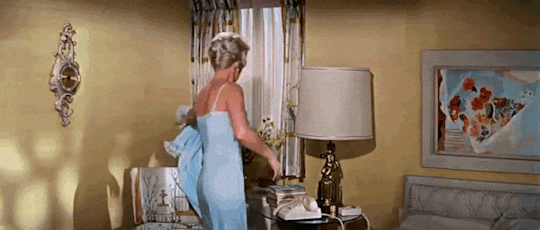
See, this is what’s called a “party line”. From the 1870s onwards, there was a shortage of available phone lines. By the time you get to the ‘60s, more and more people had personal phones in their households, but without enough lines to go around. And so, some people were forced to share their phone lines with others, hence the party line system!
Here’s the thing, though: if somebody was on the line already, anyone else on that line could hear the conversation of other people. Which is exactly what’s pissing of Jan right now, as she needs to make a call, but the line is being used by her party line partner, songwriter Brad Allen, who’s serenading his girlfriend (?) Eileen (Valerie Allen). Not sure that they’re actually dating, but Eileen definitely wants to.
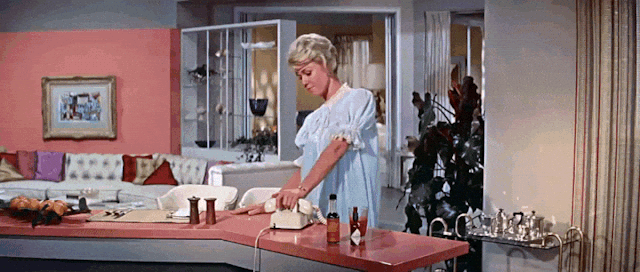
After Jan’s insistence, they get off the phone, and Jan’s able to begin her busy morning at last. Well...almost. Brad’s now talking to Yvette (Jacqueline Beer), and she wants him to sing HER song to her, which is LITERALLY just the Eileen song with a different name and in French! Which is...hilarious. It’s very funny, not gonna lie.
Once again, Jan tells him to get off the party line, and hangs up angrily. She leaves just as her cleaner woman, Alma (Thelma Ritter) arrives, fresh off of a hangover. Jan goes to try and get a line of her own, and the manager, Mr. Conrad (Hayden Rorke) makes a WEIRDLY sexist comment about jumping to the top of the list if she were pregnant. Which, yeah...weird.

Anyway, Jan, in her frustration, tells Mr. Conrad that she’s hired of sharing the line by a “sex maniac.” Mr. Conrad asks for specifics, and is AGAIN WEIRDLY SEXIST ABOUT IT. He asks if his dalliances with other women disturb her in particular. But yeah, he also says that if he is indeed a “sex maniac,” they may need to disconnect him altogether. Which has...uncomfortable undertones all on its own, but whatever, moving on.
On her way to work, Jan’s friend Jonathan Forbes (Tony Randall) shows up to bring her a STRAIGHT-UP CAR, holy shit! He’s doing so to thank her for decorating his offices (she’s an interior decorator, he’s a car dealership owner, so...fair exchange?). She insists that it’s too personal, which confuses him, as it isn’t perfume or lingerie.
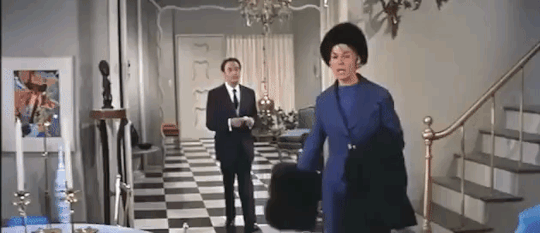
But, uh, dude? IT’S A WHOLE-ASS CAR!!! Look, I’m with her on this one, don’t just give me a fuckin’ car out of the blue! I don’t care what the reason is, tell me that shit first! And Jonathan is CLEARLY trying to make it just a little more personal, if you get my meaning.
Jan finally arrives at her office, owned by Mr. Pierot (Marcel Dalio), and she tells him that an inspector has been sent to look after Mr. Allen. This inspector is Miss Dickenson (Karen Norris), and being of the wimmins, is immediately entranced by the apparently irresistible Mr. Allen, sabotaging any attempt at inspection.

The next morning, the inspector’s report comes through, and Miss Dickinson has of course cleared him of all charges. He calls her, and the two clash in a way that definitely means they’ll never, ever, ever fall in love, no sir, not these two, not a CHANCE IN HELL
They agree to make a schedule for using the phone, and Brad accuses Jan of being jealous of his free-wheeling, bed-hopping lifestyle, which she takes great offese to. But after they hang up, she thinks on the idea of having bedroom problems. Looks like Jonathan wants to fix that, on account of being the THIRSTIEST MAN ALIVE.

Dude has three three ex-wives, all of which were revolts against his mother, for which he’s seeing a psychiatrist.
...CHRIST, the man’s a walking-talking red flag. Jan also says that she doesn’t love him, like...AT THE FUCK ALL, and the man just straight-up says, “How do you know, we’ve never even kissed.” Ai which point, any normal person would see the phantom neckbeard and whip out the fuckin’ bear mace, but Jan just lets him lean in for the goddamn kiss!!!

Jan...standards, Jan. My God. Anyway, she still turns him down, he asks her to get married again, and she leaves. For God’s sakes, man. Anyway, she goes home, where Alma’s listening to Brad serenade a girl over the party line. Jan notes the time, and tells him to get off the line. He calls back, and tells her off.
Brad gets a visitor: his old college friend FUCKIN’ JONATHAN AGAIN. He bemoans being a millionaire (po’ babyyyyy), then reveals that he’s pining over Jan, whom he doesn’t know is the person on the party line with Brad. He hears a good amount of information about Jan from Jonathan.

After the conversation, Brad tries to somewhat reconcile with Jan, but she doesn’t have any interest in doing so. That night, the two have separate affairs. Brad meets up with a woman named Marie, and serenades her with the same goddamn song from earlier, that suave motherfucker. Dude flips a switch, and the door fuckin’ LOCKS! Jesus, state-of-the-art hook-up tech of 1959.
Meanwhile Jan is attending a dinner held by an extremely client, Mrs. Walters (Lee Patrick). Needing to get home, she has her son Tony (Nick Adams) give her a ride. But on the way home, they stop and WHAT THE FUCK TONY??? I actually can’t find a clip or GIF of this, so I’ll tell you...he is ALL THE FUCK OVER HER, and it’s GROSS. CAN WE PLEASE STOP SEMI-RAPING DORIS DAY? WHAT THE FUCK, IN NO WAY IS WHAT I JUST WATCHED OK, HOLY SHIT!!!!!
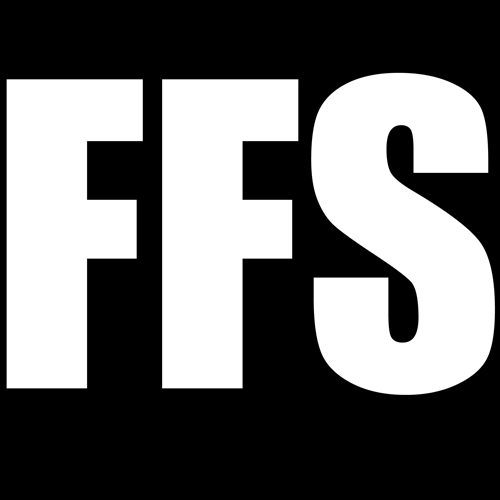
Like...wow, that was the most uncomfortable I’ve felt watching a movie in a WHILE. And it’s not even because of the act itself, it’s because of how...OK it feels in the context of the film. Jan is BARELY upset by this slimy little weasely-faced rapey CREEP LITERALLY ASSAULTING HER IN THE FUCKING CAR. And in case you were wondering, yes! This film was written by FOUR MEN.
This is gross. Sorry, but this whole sequence is gross, and it gets even LONGER, because she AGREES TO GO GET A DRINK WITH HIM. WHY, JAN? STOP ENCOURAGING THIS BEHAVIOR. He tries to get her drunk (but ends up drunk himself), but she tries to leave. However, who should be sitting one table but Brad, who realizes who this is. Jan tries to leave, but Tony tries to get her to dance with him, AND SHE ONCE AGAIN AGREES, JAAAAAAAAN!!!!!!!

And its during this time of distress for Brad that, OF COURSE, he finds himself extremely attracted to her. And since he knows who she is, but she doesn’t know him, he decides to fake his identity. And there we go, we’ve got a creepy-ass one-sided relationship set-up.
Meanwhile, lightweight Tony passes out on the floor, drunk as shit. Brad goes into help, putting on a take Texas accent and calling himself Rex Stetson. And OF FUCKING COURSE, she’s lost in his fuckin’ eyes. Damn those eyes, and his suave bullshit.
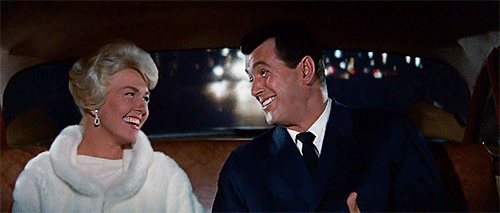
They shove Tony into a cab, then take his car, which appears to be too small for Brad, which makes sense, given the fact that Hudson was 6′4″, goddamn! The two take a cab, and the two reveal their mutual attraction to the audience, through their inner thoughts. Looks like all Jan needed for a relationship was handsome-ass Rock Hudson.
In her thoughts, she thinks on how honest and down-to-earth Rex Stetson seems, unlike “monsters” like Tony and Brad Allen. And OF COURSE this is how we get this started. OF GODDAMN COURSE this is how we start this relationship. Liar revealed, LIAR REVEALED, I FUCKIN’ HATE THAT GODDAMN TROPE SO MUCH

Soon after “Rex” takes her home, he goes home herself, and gives her a call, inviting her to dinner the following night. She accepts. Then, in the middle of the call, Brad pretends to pick up the line as himself, in order to set up the two identities as being separate...this is reverse You’ve Got Mail, isn’t it?
Think about it. Two people that hate each other, and they’ve never seen one another, but also love each other after meeting in person. IT’S THE OPPOSITE OF YOU’VE GOT MAIL. Ugh. Fine. Even down to the fact that he has a sizeable advantage over her, due to his full knowledge of the situation. He even tries to use his identity as Brad Allen to set-up their date the next night for success.
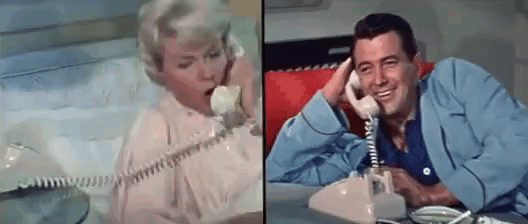
And it works, goddamn. A clever yet manipulative asshole, this dude is. They get on a horse and carriage, and we hear the inner thoughts of Jan, Brad, and the dude who owns the horse. And, yeah...it’s funny. The two go to dinner, where Jonathan shortly arrives. Brad gets him out of there with...mildly fatphobic means, but it is the 1950s, so things were just kinda...entirely that.
But in any case, Brad gets away with it, and he and Jan spend a hell of a lot of time together going all around the city. And the whole time, he’s playing the role of “Rex.” Ugh. This is a good halfway point, so let’s go to Part 2 here! See you there!
#pillow talk#michael gordon#rock hudson#doris day#tony randall#thelma ritter#nick adams#romance february#user365#365 movie challenge#365 movies 365 days#365 Days 365 Movies#365 movies a year#my gifs#mygifs#silverscreendames#old hollywood
9 notes
·
View notes
Photo

Today we remember the passing of Peter Green who Died: July 25, 2020 in Canvey Island, Essex, England
Peter Allen Greenbaum (29 October 1946 – 25 July 2020), known professionally as Peter Green, was an English blues rock singer-songwriter and guitarist. As the founder of Fleetwood Mac, he was inducted into the Rock and Roll Hall of Fame in 1998. Green's songs, such as "Albatross", "Black Magic Woman", "Oh Well", "The Green Manalishi (With the Two Prong Crown)" and "Man of the World", appeared on singles charts, and several have been adapted by a variety of musicians.
Green was a major figure in the "second great epoch" of the British blues movement. Eric Clapton praised his guitar playing, and B.B. King commented, "He has the sweetest tone I ever heard; he was the only one who gave me the cold sweats." Green was interested in expressing emotion in his songs, rather than showing off how fast he could play. His trademark sound included string bending, vibrato, and economy of style.
In June 1996, Green was voted the third-best guitarist of all time in Mojo magazine. In 2015, Rolling Stone ranked him at number 58 in its list of the "100 Greatest Guitarists of All Time". Green's tone on the instrumental "The Super-Natural" was rated as one of the 50 greatest of all time by Guitar Player in 2004.
Peter Allen Greenbaum was born in Bethnal Green, London, on 29 October 1946, into a Jewish family, the youngest of Joe and Ann Greenbaum's four children. His brother, Michael, taught him his first guitar chords and by the age of 11 Green was teaching himself. He began playing professionally by the age of 15, while working for a number of East London shipping companies. He first played bass guitar in a band called Bobby Dennis and the Dominoes, which performed pop chart covers and rock 'n' roll standards, including Shadows covers. He later stated that Hank Marvin was his guitar hero and he played the Shadows' song "Midnight" on the 1996 tribute album Twang. He went on to join a rhythm and blues outfit, the Muskrats, then a band called the Tridents in which he played bass. By Christmas 1965 Green was playing lead guitar in Peter Bardens' band "Peter B's Looners", where he met drummer Mick Fleetwood. It was with Peter B's Looners that he made his recording début with the single "If You Wanna Be Happy" with "Jodrell Blues" as a B-side. His recording of "If You Wanna Be Happy" was an instrumental cover of a song by Jimmy Soul. In 1966, Green and some other members of Peter B's Looners formed another act, Shotgun Express, a Motown-style soul band which also included Rod Stewart, but Green left the group after a few months.
In October 1965, before joining Bardens' group, Green had the opportunity to fill in for Eric Clapton in John Mayall & the Bluesbreakers for four gigs. Soon afterwards, when Clapton left the Bluesbreakers, Green became a full-time member of Mayall's band from July 1966. Green made his recording debut with the Bluesbreakers in 1966 on the album A Hard Road (1967), which featured two of his own compositions, "The Same Way" and "The Supernatural". The latter was one of Green's first instrumentals, which would soon become a trademark. So proficient was he that his musician friends bestowed upon him the nickname "The Green God". In 1967, Green decided to form his own blues band and left the Bluesbreakers.
Green's new band, with former Bluesbreaker Mick Fleetwood on drums and Jeremy Spencer on guitar, was initially called "Peter Green's Fleetwood Mac featuring Jeremy Spencer". Bob Brunning was temporarily employed on bass guitar (Green's first choice, Bluesbreakers' bassist John McVie, was not yet ready to join the band). Within a month they played at the Windsor National Jazz and Blues Festival in August 1967, and were quickly signed to Mike Vernon's Blue Horizon label. Their repertoire consisted mainly of blues covers and originals, mostly written by Green, but some were written by slide guitarist Jeremy Spencer. The band's first single, Spencer's "I Believe My Time Ain't Long" with Green's "Rambling Pony" as a B-side, did not chart but their eponymous debut album made a significant impression, remaining in the British charts for 37 weeks. By September 1967, John McVie had replaced Brunning.
Although classic blues covers and blues-styled originals remained prominent in the band's repertoire through this period, Green rapidly blossomed as a songwriter and contributed many successful original compositions from 1968 onwards. The songs chosen for single release showed Green's style gradually moving away from the group's blues roots into new musical territory. Their second studio album Mr. Wonderful was released in 1968 and continued the formula of the first album. In the same year they scored a hit with Green's "Black Magic Woman" (later covered by Santana), followed by the guitar instrumental "Albatross" (1969), which reached number one in the British singles charts. More hits written by Green followed, including "Oh Well", "Man of the World" (both 1969) and the ominous "The Green Manalishi" (1970). The double album Blues Jam in Chicago (1969) was recorded at the Chess Records Ter-Mar Studio in Chicago. There, under the joint supervision of Vernon and Marshall Chess, they recorded with some of their American blues heroes including Otis Spann, Big Walter Horton, Willie Dixon, J. T. Brown and Buddy Guy.
While touring Europe in late March 1970, Green took LSD at a party at a commune in Munich, an incident cited by Fleetwood Mac manager Clifford Davis as the crucial point in his mental decline. Communard Rainer Langhans mentions in his autobiography that he and Uschi Obermaier met Green in Munich, where they invited him to their Highfisch-Kommune. Fleetwood Mac roadie Dinky Dawson remembers that Green went to the party with another roadie, Dennis Keane, and that when Keane returned to the band's hotel to explain that Green would not leave the commune, Keane, Dawson and Mick Fleetwood travelled there to fetch him. By contrast, Green stated that he had fond memories of jamming at the commune when speaking in 2009: "I had a good play there, it was great, someone recorded it, they gave me a tape. There were people playing along, a few of us just fooling around and it was... yeah it was great." He told Jeremy Spencer at the time "That's the most spiritual music I've ever recorded in my life." After a final performance on 20 May 1970, Green left Fleetwood Mac.
Green was eventually diagnosed with schizophrenia and spent time in psychiatric hospitals undergoing electroconvulsive therapy during the mid-1970s. Many sources attest to his lethargic, trancelike state during this period. In 1977, Green was arrested for threatening his accountant David Simmons with a shotgun. The exact circumstances are the subject of much speculation, the most famous being that Green wanted Simmons to stop sending money to him. In the 2011 BBC documentary Peter Green: Man of the World, Green stated that at the time he had just returned from Canada needing money and that, during a telephone conversation with his accounts manager, he alluded to the fact that he had brought back a gun from his travels. His accounts manager promptly called the police, who surrounded Green's house.
In 1979, Green began to re-emerge professionally. With the help of his brother Michael, he was signed to Peter Vernon-Kell's PVK label, and produced a string of solo albums starting with 1979's In the Skies. He also made an uncredited appearance on Fleetwood Mac's double album Tusk, on the song "Brown Eyes", released the same year.
In 1981, Green contributed to "Rattlesnake Shake" and "Super Brains" on Mick Fleetwood's solo album The Visitor. He recorded various sessions with a number of other musicians notably the Katmandu album A Case for the Blues with Ray Dorset of Mungo Jerry, Vincent Crane from The Crazy World of Arthur Brown and Len Surtees of The Nashville Teens. Despite attempts by Gibson Guitar Corporation to start talks about producing a "Peter Green signature Les Paul" guitar, Green's instrument of choice at this time was a Gibson Howard Roberts Fusion guitar. In 1986, Peter and his brother Micky contributed to the album A Touch of Sunburn by Lawrie 'The Raven' Gaines (under the group name 'The Enemy Within'). This album has been reissued many times under such titles as Post Modern Blues and Peter Green and Mick Green – Two Greens Make a Blues, often crediting Pirates guitarist Mick Green.
In 1988 Green was quoted as saying: "I'm at present recuperating from treatment for taking drugs. It was drugs that influenced me a lot. I took more than I intended to. I took LSD eight or nine times. The effect of that stuff lasts so long ... I wanted to give away all my money ... I went kind of holy – no, not holy, religious. I thought I could do it, I thought I was all right on drugs. My failing!"
Enduring periods of mental illness and destitution throughout the 1970s and 1980s, Green moved in with his older brother Len and Len's wife Gloria, and his mother in their house in Great Yarmouth, where a process of recovery began. He lived for a period on Canvey Island, Essex.
Green married Jane Samuels in January 1978; the couple divorced in 1979. They had a daughter, Rosebud(born 1978).
Green died on July 25, 2020 at the age of 73.
2 notes
·
View notes